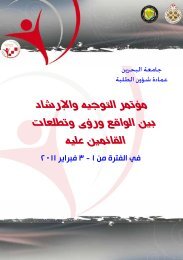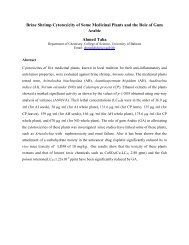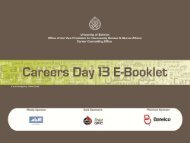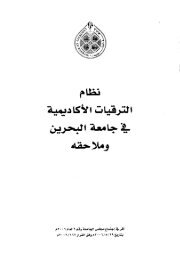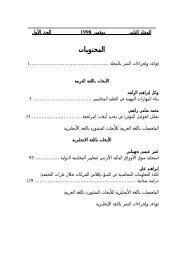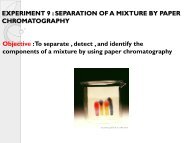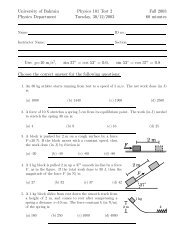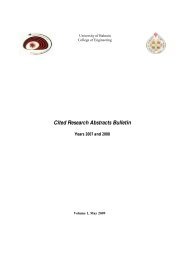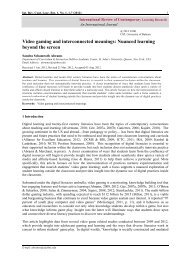د. ÙÙا بÙت عÙ٠اÙÙعÙ٠٠د. ÙÙÙÙÙÙÙÙادر ÙاظÙÙÙÙÙÙÙÙ٠د. ج٠ا٠... - جا٠عة اÙبØرÙÙ
د. ÙÙا بÙت عÙ٠اÙÙعÙ٠٠د. ÙÙÙÙÙÙÙÙادر ÙاظÙÙÙÙÙÙÙÙ٠د. ج٠ا٠... - جا٠عة اÙبØرÙÙ
د. ÙÙا بÙت عÙ٠اÙÙعÙ٠٠د. ÙÙÙÙÙÙÙÙادر ÙاظÙÙÙÙÙÙÙÙ٠د. ج٠ا٠... - جا٠عة اÙبØرÙÙ
Create successful ePaper yourself
Turn your PDF publications into a flip-book with our unique Google optimized e-Paper software.
195<br />
2 0 1 1<br />
مقاربات<br />
of the Jewish subject.<br />
Here, Badiou used the concepts he developed<br />
in his book Being and Event; the event is<br />
established (i.e. comes to Being) in a particular<br />
site, it nonetheless has to transgress it in order<br />
to succeed as a truth procedure. That is how<br />
Badiou concluded that for Paul, although the<br />
resurrection of Christ’s event was dependent in<br />
its Being on its site (i.e. the Jewish tradition),<br />
its truth should be independent of that<br />
particular site. Paul’s assertion in his letter to<br />
the Corinthians: “Circumcision is nothing, and<br />
uncircumcision is nothing” (I Cor. 7:19), was<br />
a testament that “the new universality bears no<br />
privileged relation to the Jewish community.”<br />
(23)<br />
In Badiou’s terms, Jews and Greeks were<br />
subjective dispositions, and regimes of<br />
discourse (to copy Foucault), in opposition of<br />
which Paul presented a third discourse which<br />
was his own. In this case, Paul has “instituted<br />
‘Christian discourse’ only by distinguishing its<br />
operations from those of Jewish discourse and<br />
Greek discourse”. (41) A by-product of Paul’s<br />
discourse was a fourth one, which Badiou<br />
called ‘mystical’ discourse. More specifically,<br />
Badiou claimed, it was a product of the ternary<br />
dialectic between the three discourses: Jewish,<br />
Greek and Pauls. This dialectic should require,<br />
as Hegel would demand as part of his routine<br />
of the ‘Absolute Knowledge’ of a ternary<br />
dialectic, a fourth discourse, which was in this<br />
case the mystic discourse of miracles.<br />
Universalism: A Universal Singularity<br />
Fighting the “abstract universality of our<br />
epoch” (Being and Event p.xii) that was made<br />
possible by the alliance between the ‘free’<br />
market forces and liberal parliamentarianism,<br />
Badiou tried to provide an alternative model of<br />
universality, which he called ‘universalism’.<br />
By characterizing the capitalist universality<br />
as abstract, Badiou pointed it out as a ‘false<br />
universality’, whose monetary abstraction of<br />
value was not hindered by accommodating<br />
the “kaleidoscope of communitarianisms.” (7)<br />
This has produced a ‘false’ sense of liberty in<br />
society.<br />
The four truth procedures identified by Badiou<br />
in the “Art, Love, Politics, and Science”<br />
typology face the risk of obliteration at the<br />
hand of capital’s false universality, as each truth<br />
procedure was merchandised and packaged in<br />
a category of ‘commercial presentation’ via<br />
a process of ‘nominal occlusion’: “the word<br />
‘culture’ comes to obliterate that of ‘art’.<br />
The word ‘technology’ obliterates the word<br />
‘science’. The word ‘management’ obliterates<br />
the word ‘politics’. The word ‘sexuality’<br />
obliterates the word ‘love’.” (12)<br />
Theoretical Support for capital’s false<br />
universality came from the liberal conception<br />
of the relativity of truth. Against this<br />
relativism that celebrated and effectively<br />
emboldened the cultural differences in society,<br />
Badiou advocated that if truths existed in a<br />
situation, they would have to be “indifferent<br />
to differences” (Being and Event xii) because<br />
differences couldn’t play a ‘normative role’;<br />
a role in finding the truths in the situation.<br />
This fundamentally anti-relativist doctrine<br />
was what drove Badiou to formulate his<br />
universalism.<br />
After a polemic attack on what he called the<br />
‘articulated whole’ of the abstract homogeneity<br />
of the capital (which abstracted everything to<br />
monetary value) and the identitarian protest<br />
(which manifested as cultural/ethnic groups<br />
sought to be recognised as separate cultural<br />
- 6 -





